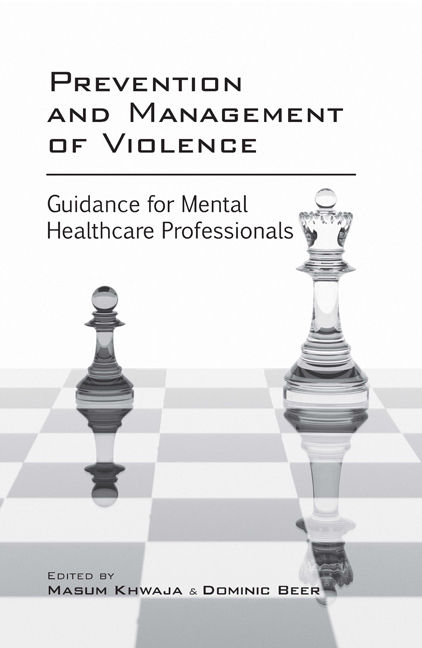Book contents
- Frontmatter
- Dedication
- Contents
- Abbreviations
- List of boxes and tables
- Working group
- Executive summary and recommendations
- 1 Legislation relevant to the management of violence by persons with mental disorders
- 2 Safeguarding vulnerable adults and children exposed to violence
- 3 Risk assessment and management
- 4 Risk prevention and non-pharmacological management of violence in acute settings
- 5 Use of medication and ECT in the management of violence
- 6 Post-incident management
- 7 Management of the risk of violence in the community
- 8 Management of violence in older adults
- 9 Management of violence in people with intellectual disability
- 10 Management of violence in prisons
- 11 Liaison with the police, Crown Prosecution Service and MAPPA
- 12 Information-sharing with victims of crime committed by persons with mental disorders
- 13 Clinical governance
- Appendix Organisations that victims of crime can contact
- Index
11 - Liaison with the police, Crown Prosecution Service and MAPPA
- Frontmatter
- Dedication
- Contents
- Abbreviations
- List of boxes and tables
- Working group
- Executive summary and recommendations
- 1 Legislation relevant to the management of violence by persons with mental disorders
- 2 Safeguarding vulnerable adults and children exposed to violence
- 3 Risk assessment and management
- 4 Risk prevention and non-pharmacological management of violence in acute settings
- 5 Use of medication and ECT in the management of violence
- 6 Post-incident management
- 7 Management of the risk of violence in the community
- 8 Management of violence in older adults
- 9 Management of violence in people with intellectual disability
- 10 Management of violence in prisons
- 11 Liaison with the police, Crown Prosecution Service and MAPPA
- 12 Information-sharing with victims of crime committed by persons with mental disorders
- 13 Clinical governance
- Appendix Organisations that victims of crime can contact
- Index
Summary
Offences committed by mental health patients
Police are regularly called to hospitals and community mental health sites when someone with a mental health problem commits a crime. In the past many offences, including violent offences, committed by mental health patients were neither investigated nor prosecuted. This was due to a perception that patients could not be held responsible for their actions, that the likelihood of conviction was unacceptably low or that prosecution was not necessary to protect the public if the patient was already in hospital. Modern police policy is that the criminal law has an equal application inside and outside mental health units and there should be a presumption that patients have the capacity in law to take responsibility for their actions. Mental health professionals should be prepared to liaise with the police and help them to make better-informed decisions about investigations. Positive action against the offender by the police may assist in future management of the patient.
The police should seek the views of the consultant in charge before deciding how best to deal with the matter. They may ask the consultant to assess whether the patient is fit to be interviewed and detained at a police station. This should be done as promptly as possible and the assessment forwarded in writing to the police custody officer, for the attention of the forensic medical examiner (police doctor) or custody nurse. The mental health trust should provide an appropriate adult to accompany the patient at police interview and ensure that they are legally represented.
If the patient is charged, the court may ask the consultant for a report on the patient's fitness to plead and stand trial. National Health Service staff should be prompt in responding to such requests and avoid passing them on to different teams and departments. Similarly, staff should cooperate with the police in arranging to provide witness statements and medical reports relating to the victim's injuries. Those who give statements should add their contact details and the dates when they know they will be unavailable to attend court, in order to avoid delay and additional court costs.
- Type
- Chapter
- Information
- Prevention and Management of ViolenceGuidance for Mental Health Professionals, pp. 103 - 111Publisher: Royal College of PsychiatristsFirst published in: 2017



